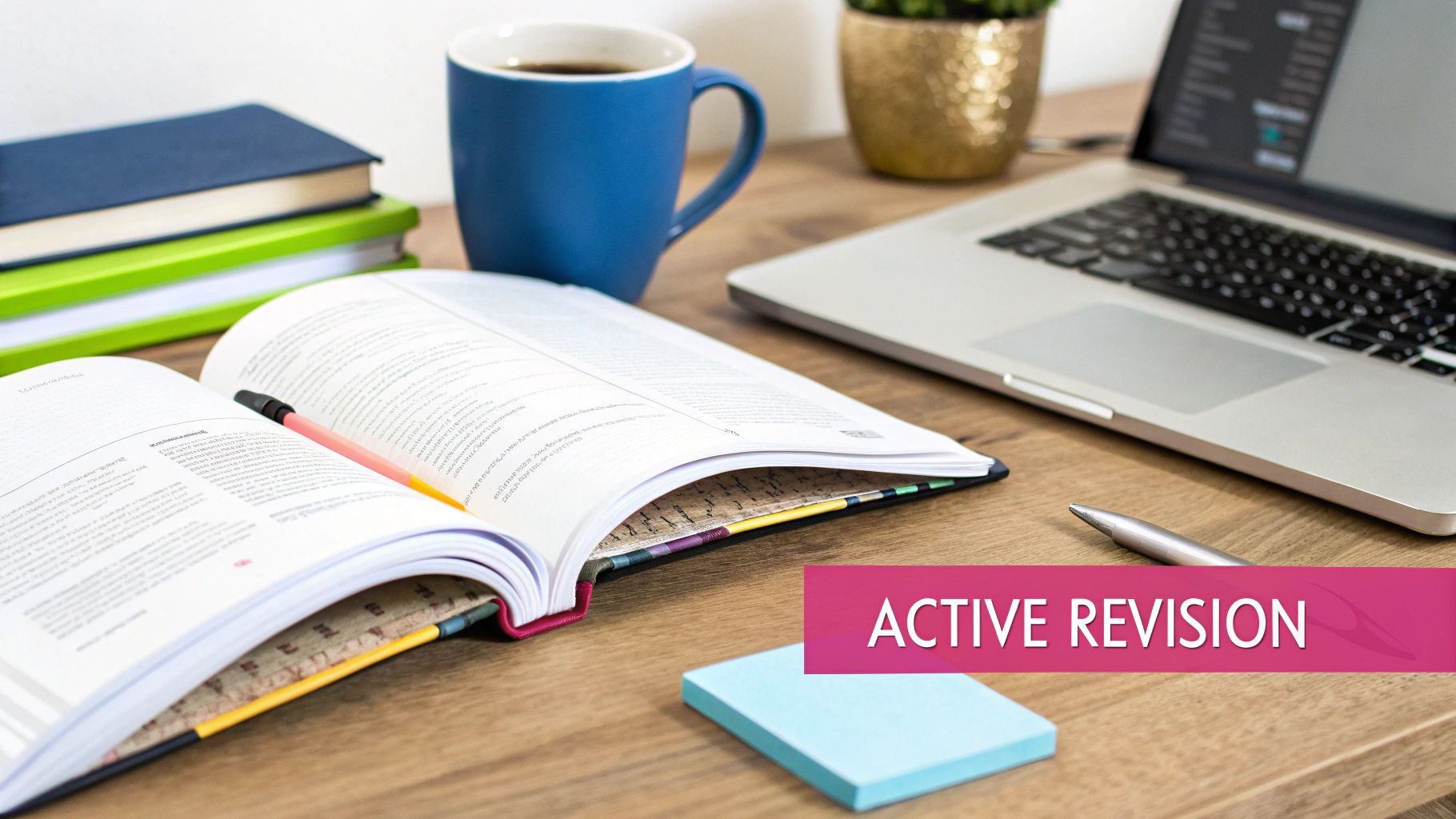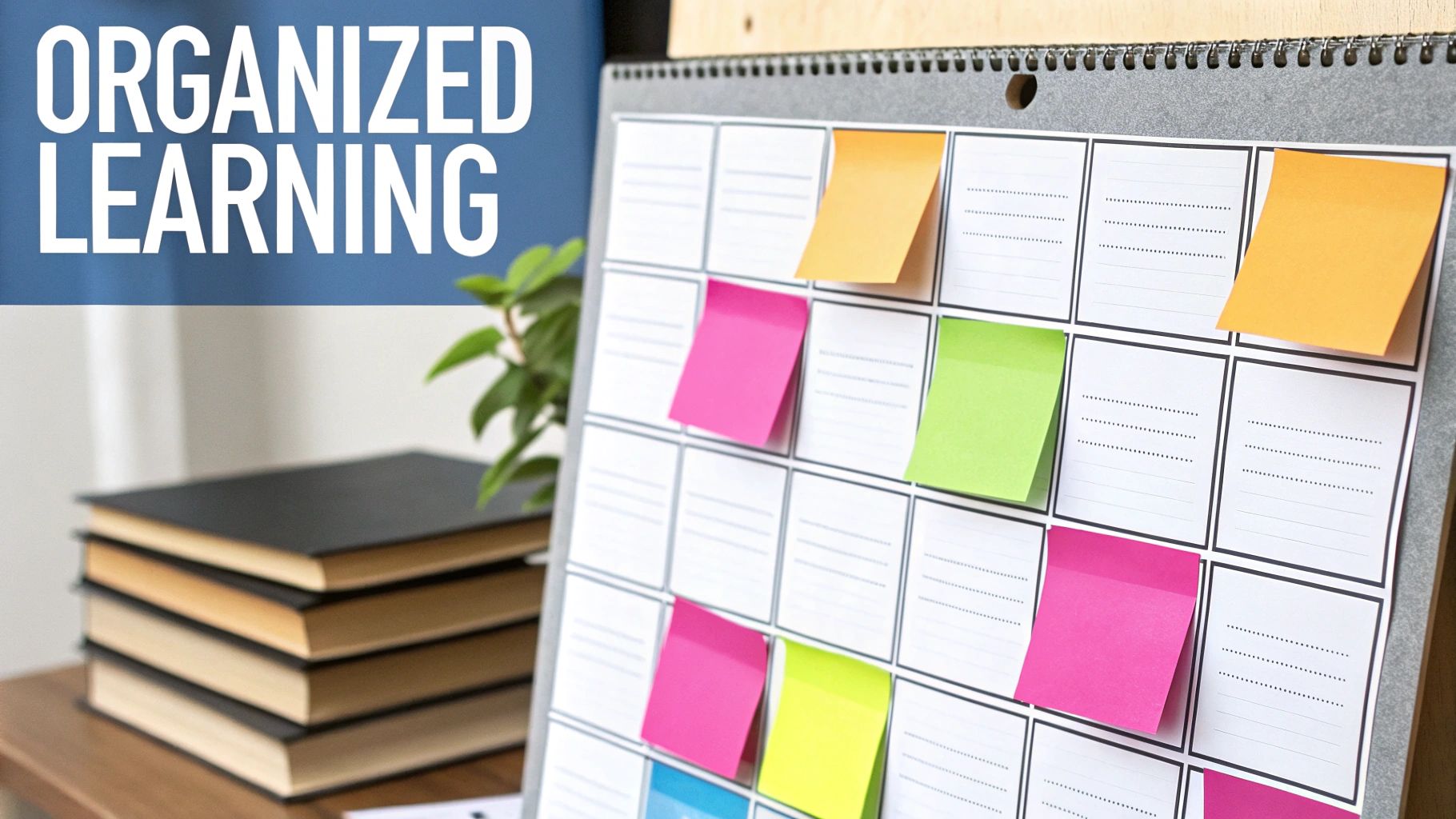
7 Best Revision Methods That Actually Work: A Science-Based Guide to Exam Success
The Science Behind Effective Revision
Understanding how our brains learn can help explain why some students excel in exams while others struggle, even when putting in similar study hours. The core difference often comes down to using evidence-based revision methods that work with – rather than against – how memory actually functions.
How Memory Works: Encoding, Storage, and Retrieval
Your brain processes information in three key stages, much like a well-organized library system. First comes encoding, where you initially process new information. Next is storage, where that information gets filed away. Finally, there's retrieval – accessing that stored knowledge when needed. Good revision techniques need to support all three stages to build strong, lasting memories.
Why Timing Matters More Than Total Hours
Many students fall into the trap of cramming before exams. While this might help you pass in the short-term, the information quickly fades. A better approach is spaced repetition – reviewing material at planned intervals. This method helps strengthen the brain's retrieval pathways, making it easier to recall information when you need it.
Active Recall: The Key to Unlocking Long-Term Memory
Simply reading and highlighting notes might feel productive, but these passive methods don't create strong memories. The real power lies in active recall – deliberately testing yourself on material without looking at your notes. Methods like practice tests and flashcards make your brain work harder to retrieve information, which builds stronger neural connections for long-term retention.
Real student data backs this up. A comprehensive 'Revision Census' conducted between 2020-2023 surveyed 33,435 students across 56 English schools. The results showed that while 37% of revision time was spent on passive methods like re-reading and highlighting, students who used active recall strategies like practice testing typically achieved better grades. For more details, check out Exam Study Expert's analysis.
Aligning Your Revision With Your Brain
By understanding these core principles of memory and learning, you can make your revision more effective. Focus on active recall techniques and spaced repetition rather than passive methods. This science-based approach turns revision from mindless repetition into focused, productive learning that leads to better exam results and deeper understanding.
Mastering Active Recall Through Retrieval Practice

When it comes to effective studying, active recall stands out as one of the most powerful learning techniques available. At its core, active recall forces you to retrieve information from memory rather than passively reviewing it. This simple shift makes a huge difference in how well you retain and understand material.
What is Retrieval Practice?
Think of retrieval practice like exercising your brain – just as muscles grow stronger with use, your memory becomes more robust when you actively recall information. Instead of just reading over your notes again and again, you challenge yourself to pull facts and concepts from memory without looking at the source material.
Research strongly supports the effectiveness of this approach. Studies have repeatedly shown that testing yourself on material leads to significantly better long-term retention compared to simply reviewing notes multiple times. For more details on the science behind this technique, check out this overview of effective revision techniques.
Implementing Retrieval Practice: Practical Strategies
You can practice retrieval in several different ways depending on what works best for you:
- Flashcards: Create cards with questions on one side and answers on the other to test key concepts
- Practice Tests: Work through sample exam questions under timed conditions
- The Feynman Technique: Explain topics in simple terms as if teaching someone else
- Self-Explanation: Close your notes and explain main ideas in your own words
Structuring Your Recall Sessions
To get the most out of retrieval practice:
- Space Out Your Reviews: Start with short intervals between practice sessions and gradually increase the gaps
- Mix Up Topics: Combine different subjects in each study session to strengthen connections between concepts
- Use Multiple Methods: Switch between different retrieval techniques to keep your brain engaged
Common Pitfalls to Avoid
Watch out for these common mistakes that can make retrieval practice less effective:
- Passive Rereading: Simply scanning notes creates a false sense of knowing the material
- Last-Minute Cramming: Rushing through content right before exams doesn't lead to lasting learning
- Pure Memorization: Focus on understanding concepts, not just memorizing facts
By making active recall through retrieval practice a core part of your study routine, you'll build stronger memories and develop deeper understanding of your subjects. This approach takes more effort than passive review, but the improved results make it worthwhile. Tools like Notescast can help by turning your notes into engaging content that supports regular retrieval practice.
Getting More From Spaced Repetition
Active recall helps you learn, but its real power comes when paired with spaced repetition. This method transforms how we study by working with our brain's natural learning patterns. Rather than cramming everything at once, spaced repetition involves reviewing material at carefully timed intervals. When done right, this approach helps lock information into your long-term memory.
How Memory Fades: The Forgetting Curve
The forgetting curve shows how quickly we lose newly learned information without review. While initial memory loss happens fast, reviewing the material slows this decline. Each review strengthens the memory, making it easier to recall later. Spaced repetition works by scheduling reviews just before you're likely to forget, reinforcing the information when it matters most.
Simple Ways to Use Spaced Repetition
You can start using spaced repetition with these proven methods:
- The Leitner System: Use flashcards sorted into different boxes. Cards you answer correctly move to boxes reviewed less often, while missed cards return to more frequent review.
- Digital Tools: Apps like Anki handle the scheduling automatically, showing you cards at the right times based on how well you remember them. These tools work well with platforms like Notescast, which helps prepare your study materials.
- The 2357 Method: Review new material on days 2, 3, 5, and 7 after first learning it. Learn more about effective review strategies from BCU's revision guide.
Making It Work for Different Subjects
Spaced repetition can help with any subject when adapted properly:
- Languages: Use it to build vocabulary and practice grammar patterns
- Math and Science: Review formulas and work through sample problems
- History and Literature: Test yourself on key dates, events, and themes
Fitting It Into Your Schedule
Many students worry about finding time for regular review. The good thing about spaced repetition is its flexibility. Even 10-15 minute review sessions can make a big difference when done consistently. Start small with a few weekly reviews, then add more as it becomes part of your routine.
Combining Methods for Better Results
Spaced repetition works even better when used with other study techniques. For example, using active recall with flashcards and spacing out your practice creates a powerful learning combination. Try different approaches to find what gives you the best results. When used properly, spaced repetition helps you both perform better on tests and develop deeper understanding that lasts.
Breaking Free from Ineffective Study Habits

Take an honest look at how you study. Many students spend hours using methods that feel productive but don't lead to better exam results. Let's examine which study habits actually work – and which ones you should leave behind.
The Problem With Passive Revision
When you highlight text or reread chapters, it creates a false sense of learning. These passive techniques require little mental effort, making material feel familiar without building true understanding. For instance, highlighting entire paragraphs might feel satisfying, but it doesn't push your brain to process and retain the information in a meaningful way.
Why Cramming Doesn't Work
Many students try to memorize large amounts of content right before an exam through cramming. This overwhelms your short-term memory without building lasting knowledge. Think of it like pouring too much water into a small cup – most spills out and is wasted. While you might remember enough to get through tomorrow's test, that information quickly fades.
The Power of Active Revision
Active revision methods engage your brain more deeply than passive studying. When you actively retrieve information from memory, you strengthen those neural pathways and improve long-term retention. The more you practice recalling material, the better you'll remember it – similar to how exercise builds muscle. Active recall, spaced repetition, and practice testing are key techniques that make this possible.
Transitioning to Effective Methods
Changing study habits takes time and practice. Begin by adding one active technique to your routine, like testing yourself with flashcards after reading a chapter. Plan regular review sessions using spaced repetition – study material first after 2 days, then after 5 days, and again after a week. This structured approach works better than last-minute cramming. A recent study of medical students in Pakistan found that while most relied on highlighting and rereading, many were eager to adopt evidence-based methods. See the full research here. Tools like Notescast can help by converting your notes into videos that support active recall, especially helpful for students who struggle with focus. By moving away from passive techniques and embracing active learning, you'll retain more information and perform better on exams.
Building Your Personalized Revision Strategy

Everyone learns differently, which is why generic study advice often falls short. What helps one student excel might leave another struggling to grasp key concepts. Creating a revision approach that matches your individual needs is essential for academic success. Let's explore how to build a study strategy that works specifically for you.
Understanding Your Learning Style
Before selecting specific study techniques, take time to identify how you naturally learn best. Some students grasp concepts quickly through visual aids like diagrams and charts. Others retain information better by listening to explanations or discussing ideas out loud. You might find that hands-on practice through writing and rewriting helps concepts stick. For example, if you're visually oriented, creating detailed mind maps with color-coding could help you connect and remember key ideas more effectively.
Assessing Subject Requirements and Time Constraints
Each subject demands its own unique revision approach. Mathematics and science often need focused practice with equations and problem-solving. Essay-based subjects require analysis and writing practice. Look at your course requirements and deadlines to determine where to focus your energy. Map out your available study time realistically on a calendar, giving priority to your most challenging topics. This helps ensure you cover all necessary material without feeling overwhelmed.
Combining Revision Methods Effectively
The most successful students use multiple study techniques together. You might start with flashcards to memorize important terms, then cement your understanding through practice questions. Or begin by creating a mind map of key concepts, followed by teaching those ideas to someone else to spot any gaps in your knowledge. Try different combinations of methods – much like finding the right recipe, you'll need to experiment to discover what blend works best for your learning style.
Setting Achievable Goals and Adapting Your Strategy
Break your revision into clear, manageable goals rather than trying to tackle everything at once. This might mean mastering one chapter per week or learning a specific set of concepts each day. Track your progress through practice tests and assignments to identify areas needing more attention. Be ready to adjust your approach if certain methods aren't helping you improve. Use this feedback to fine-tune your study plan and focus on effective techniques.
Balancing Techniques Across Subjects and Maintaining Motivation
Create a weekly schedule that gives appropriate time to each subject while using varied study methods. Consider using Notescast to transform your notes into engaging video content, making difficult topics more approachable. Remember to reward yourself when you hit study milestones – whether that's taking a short break to enjoy your favorite show or spending time with friends. These small celebrations help maintain your momentum throughout the revision period.
Maintaining Peak Performance and Motivation

Success in revision requires more than just good study techniques – it demands sustained mental energy and drive. When you understand how to manage your focus and motivation effectively, especially during intense study periods, you can maintain high performance over the long run. Let's explore practical approaches that top students use to stay sharp and motivated.
Creating an Optimal Study Environment
Your study space directly impacts your ability to concentrate. While a clean desk helps, the ideal environment goes beyond basic organization. Pay attention to elements like sound levels – some people work best in complete quiet, while others benefit from gentle background music or white noise. Make sure you have good lighting to reduce eye strain and comfortable seating that supports proper posture. Small adjustments to your surroundings can make a big difference in your ability to focus.
Managing Mental Fatigue and Preventing Burnout
Just as your body gets tired from exercise, your brain needs proper rest between study sessions. Watch for signs that you're mentally drained, such as trouble focusing, feeling irritable, or having difficulty remembering new information. To avoid burnout, build regular breaks into your schedule. The Pomodoro Technique, which alternates 25-minute focused work periods with short rests, helps many students maintain steady progress without getting overwhelmed.
Developing Effective Reward Systems
Smart rewards can boost your drive to study, but choosing the right ones matters. For example, planning to watch your favorite show after completing a week of productive study can motivate you to stay on track. During study breaks, skip activities that might derail your focus – instead, try taking a brief walk, enjoying a healthy snack, or doing a quick meditation exercise. These choices help refresh your mind while keeping you in a productive mindset.
Staying Motivated Through Challenging Material
When faced with difficult topics, motivation often dips. Break large assignments into smaller, achievable tasks to create a sense of steady progress. Picture yourself mastering the material and feeling confident during exams – this mental rehearsal can give you the push needed to work through tough concepts. Remember that mastering challenging content is like building muscle – consistent effort leads to gradual but significant improvement.
Real-World Examples and Practical Tips
Students who excel at maintaining motivation often combine several proven strategies. Some track their progress on visual boards, marking off completed topics for a clear sense of achievement. Others join study groups where mutual support helps everyone stay accountable. Here are key habits that support sustained focus:
- Regular Exercise: Moving your body enhances brain function and reduces stress
- Mindfulness and Meditation: Taking time to center yourself improves concentration
- Adequate Sleep: Good rest is essential for learning and mental sharpness
By weaving these approaches into your study routine, you can maintain strong performance throughout your revision period. Remember that effective studying depends as much on your approach as the material itself. Notescast can help transform your study materials into engaging video content, making even complex topics more approachable and interesting.
